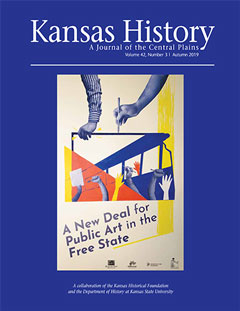December 20, 2019
Fall issue of Kansas History: A Journal of the Central Plains just released

The volume 42, autumn 2019 issue of Kansas History: A Journal of the Central Plains has been released. The journal is published through a partnership between the K-State history department and the Kansas Historical Foundation/Kansas Historical Society.
The new issue contains accounts from slave catching in Kansas to a review of movies by Kansas filmmakers or movies about Kansas. Below are abstracts of the articles appearing in the fall issue of the journal.
Brent M. S. Campney, "'The Infamous Business of Kidnapping': Slave-Catching in Kansas, 1858-1863."
Between 1858 and 1863, white slave-catchers in Kansas kidnapped numerous blacks — free persons and fugitive slaves alike — and either returned them to aggrieved slave-masters or sold them into bondage. In this article, historian Brent Campney identifies nearly three dozen incidents, a number that may, in fact, represent a fraction of the true number of such incidents and thus challenges any assumption that such incidents were rare. By focusing on the period 1858 to 1863, "The Infamous Business of Kidnapping" examines years when free-state whites, not proslavery ones, were in control and the free black population was increasing rapidly. In so doing, it shows that slave-catching was a frequent occurrence. It also shows that slave-catching appeared to enjoy the tacit support of many whites, from ordinary free-state settlers to local and state officials. While not all whites participated in slave-catching, many of them endorsed it — some overtly, and others by failing to pursue, arrest, or prosecute slave-catchers. Finally, it demonstrates that, while lynchers and officers relentlessly hunted and killed white men accused of horse theft, they rarely hunted those accused of kidnapping blacks and even more rarely killed them. Responding to earlier scholarship, Campney focuses to a much greater extent on the experiences, the agency and the actions of blacks.
Isaias J. McCaffery, "The Greeks in Kansas: Immigrant Life on the Contested Edge of American Whiteness, 1880-1920."
"The Greeks in Kansas" surveys the roots of Greek American life in Kansas, focusing on the labor and business activities that allowed the early immigrants to gain a foothold and survive in a new and often hostile environment. Historian Isaias McCaffery demonstrates that before 1920, generally native-born residents in the Sunflower State considered Greeks to be non-white. Evidence supports the broader findings of "whiteness" scholars David R. Roediger and Matthew Frye Jacobson who indicate that ethnic communities like the ?λληνες (Ellines) spent at least a generation "on probation" before attaining the full mantle of white Americanism. Substantial numbers of Greeks, Italians, and Mexicans first appeared as manual laborers for the railroads, and the reception by Anglos was often violent. Several towns forcefully expelled the Greek trackmen, and Kansas City witnessed a full-scale riot in 1909. Many bachelors began as peddlers, worked for the railroads, or shined shoes to get started. Early businesses sold fruit, candy and ice cream, gradually amassing the capital that financed the opening of restaurants. McCaffery closes by suggesting factors that assisted Kansas Greeks in elevating their social status.
Thomas Prasch, edited and introduced by, "'Our Blood-Drenched Frontiers': Violence and Social Justice in Recent Films of Kansas and the Great Plains."
From the serial killings of the "Bloody Benders" in the early 1870s, reenacted in the film "Bender," to the multiple murders in the imaginative alternative contemporary Kansas depicted in Brightburn, a thread of blood runs through this survey of recent films about Kansas and the Great Plains. From the genocide of the Indian Wars and the gunplay that make the West of Westerns "wild," through the Clutter family murders immortalized in Truman Capote's "In Cold Blood," to the killings that propel the film plots set in the present day, death and violence figure prominently here. Balancing that emphasis, films concerning the pursuit of social justice also figure prominently in this year's selection. Fighting the Ku Klux Klan in Kansas in the 1920s and in Colorado in the 1970s, the struggle for Native American rights from the 1890s to the present, the demand for an end to discrimination against African Americans in Lawrence in the 1910s and in Topeka in the 1950s, and Garden City's policy of welcoming new immigrants to their community all feature in the films treated here. Our film review survey begins by looking back at a classic, Gypsy Moths, on the 50th anniversary of its release, followed by reviews of 19 feature films and documentaries released during the last two years that focus on Kansas and the Great Plains.
Audrey Coleman and Sarah D'Antonio Gard, "Collection Review: What a Congressional Collection can Tell Us about Vietnam: The Robert J. Dole Archives."
Representing the start of a new series, this collection review by Audrey Coleman and Sarah D'Antonio Gard gives an overview of the Robert J. and Elizabeth Dole Archives and Special Collections — or, the Dole Archives — which opened in 2003 and is housed at the Dole Institute of Politics at the University of Kansas. Senator Bob Dole's papers comprise approximately 1,700 linear feet of material and include those related to his roles in the U.S. House of Representatives, U.S. Senate, Republican Leadership, as well as campaign and personal papers. They offer important insights about the workings of government and concerns of the American people during the period 1960-1996. The Dole Archives are a particularly strong resource for understanding policymaking, leadership and service, from a variety of perspectives, during the volatile Vietnam War era.
